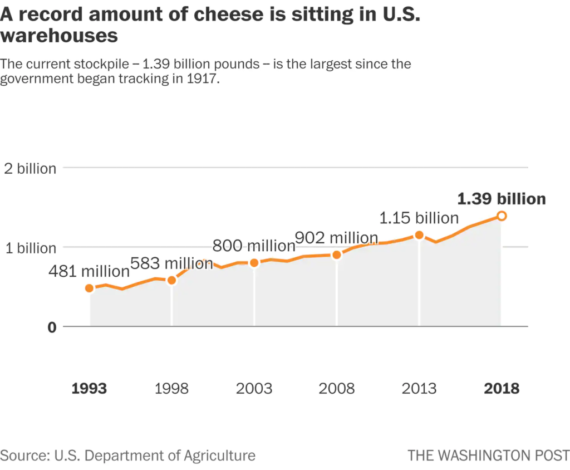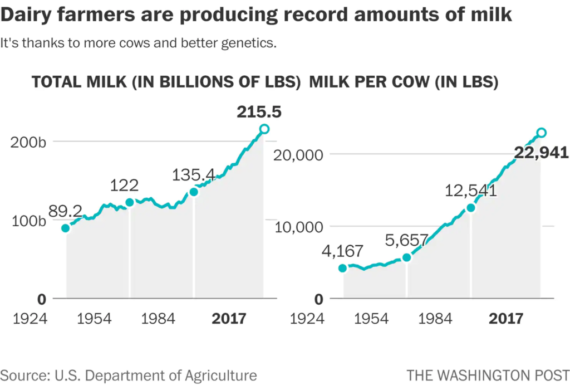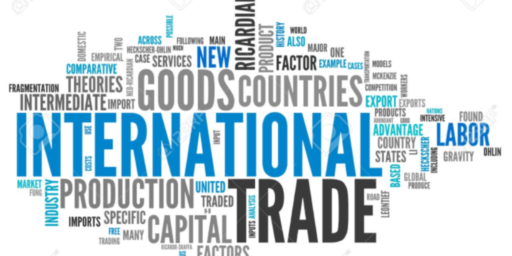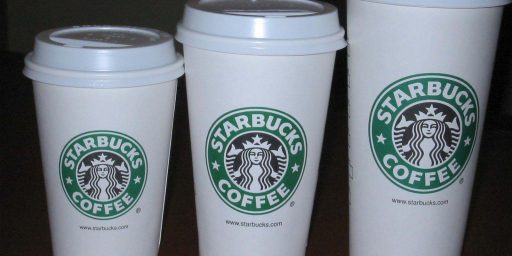The Great American Cheese Stockpile
The Federal Government is hoarding an awful lot of cheese.

The Washington Post’s Wonk Blog reports that the nation’s cheese stockpile is at a record high:
The United States has amassed its largest stockpile of cheese in the 100 years since regulators began keeping tabs, the result of booming domestic production of milk and consumers’ waning interest in the dairy beverage.
The 1.39 billion-pound stockpile, tallied by the Agriculture Department last week, represents a 6 percent increase over this time last year and a 16 percent increase since an earlier surplus prompted a federal cheese buy-up in 2016.
Analysts say commercial warehouse stocks have swelled because processors have too much milk on their hands, and milk is more easily stored as cheese. Demand has also fallen as school cafeterias close for the summer and restaurants wind down the cheesy specials they offer in the winter and early spring.
Some have grown concerned that stockpiles will build further yet if trade tensions with China and Mexico cut into cheese exports. Cheese prices have fallen sharply, they say, eroding dairy farmers’ already thin margins.
This chart shows the extent to which the cheese stockpile has grown:

Now you may be asking yourself why the United States government is stockpiling more than a billion pounds of cheese? Is Donald Trump planning on having nachos with a really big bowl of queso? Are we going to have a really big pizza party as part of Donald Trump’s military parade in November? Have the rats finally taken over the government? Does this mean we might get those taco trucks on every corner that we were promised if Hillary Clinton was elected? It turns out that answer is much more mundane than that.
Basically, the Federal Government buys up excess production from dairy farmers in order help maintain dairy price supports and has been doing so for decades now. With dairy products falling out of favor due to health concerns, the demand for dairy is lower than it was in the past even though the population has increased. In an ordinary world, of course, this reduction in demand would lead either to a decrease in supply as dairy farmers adjust to the new market, or a decrease in price in response to lower demand, or potentially both depending on market conditions. This is not an ordinary world, however, or at least not one that makes any logical sense. Thanks to dairy price supports that have been in place in one form or another for decades, the U.S. Department of Agriculture is obligated to help support the price of milk at certain levels to guarantee that dairy farmers don’t lose money. Since you can’t really store milk for long periods of time, much of that milk ends up being made into cheese, which can be stored for longer periods of time without spoiling as long as it is stored at a proper temperature.
The inevitable result of this is that dairy production continues to skyrocket, notwithstanding the fact that demand falls, as this chart demonstrates quite aptly:

As I said, in a rational universe this wouldn’t be happening. The dairy industry would be required to operate the same way any other business does, and if individual producers can’t survive because of falling prices or reduced demand then they would go out of business. As harsh as that may sound, that’s how economics is supposed to work. Using taxpayer dollars to prop up any industry is wrong, and it’s even more wrong when all we get out of it is a whole lot of government cheese.






I remember getting free government cheese after Hurricane Frederic in 1979.
Cheese purchases are honestly just the tip of the iceberg with regard to the degree of subsidy afforded to US agriculture. Americans spend untold billions of taxpayers dollars every year propping up a segment of the economy that is – to put it bluntly – just no longer fiscally viable.
It’s a product of the outsized influence the political system there affords to the sparsely populated flyover states.
Stop beating up on all the hard working Real Americans ™ who have fallen on hard times that this program helps and put the blame where it squarely belongs: On all those coastal elitists and the lieberal city folk with their welfare checks and SNAP cards and Medicaid.
@OzarkHillbilly:
The really fun part is that programs like SNAP are also de facto agriculture subsidies.
Even the EU has gotten the message by now, so for years the market got flooded with cheap “Christmas butter” from EU warehouses for baking, and ghee was dirt cheap too.
What kind of cheese?
Yep. The cheese stockpile is a knock-on effect of milk subsidies. We could improve our relations with our neighbors, help developing economies, and make our own economy more efficient by abolishing agricultural subsidies. These are usually defended as helping poor, struggling farmers but, as is usually the case with subsidies in the United States, the subsidies tend to go to the richest:
Back in the 1980s, wasn’t there some sort of government cheese and butter giveaway to people over 65?
@HarvardLaw92:
You’re wrong on the facts. Of the counties that are the top 10 in receiving agricultural subsidies, four are in California, three in Texas, and one either in Washington, North Dakota, and South Dakota and California is the eighth largest recipient of agricultural subsidies overall. Texas, that champion of small government and the free market, is, of course, #1, illustrating a fundamental attitidue of Jacksonians. In fairness a district-level breakdown is more favorable to your argument. In other words the situation is more complex than your characterization paints it.
But you’re right in that farmers have outsized political influence in the U. S., a problem we share with France.
@Michael Reynolds:
I’m pretty sure it’s not Camembert, Gruyere, Stilton, Gorgonzola, or Boursin.
@CSK: but it’s probly cheddar, which is also good.
The dairy industry (and other agriculture industries, for that matter) also enjoys massive protective tariffs that no other industry receives.
A system of bread and circuses and payoffs must subsidize the bread with payoffs.
@Dave Schuler:
No, in your effort to defend the Dust Bowl, you conflated political power with amount of aid received.
Get back to me when just those states in your top ten (which is somewhat misleading because it includes indirect water subsidies) – by themselves – have the political power in the Senate to pass these egregious subsidies. The continued existence of these programs is only possible because of the skewed political power afforded to states like Nebraska and Kansas.
@teve tory:
It could be cheddar, but more likely most of it is that processed stuff known as “American” cheese.
If I were in charge it would all become feta, gorgonzola, parmesan, gruyere, asiago, and cheddar.
@CSK:
American “cheese,” the yellow slices served on cheeseburgers, is not cheese, but rather something known as a cheese product. It does contain cheese, but also additives, vegetable oils, coloring, etc.
You know the saying about sausages? It works as well for cheese products.
Yet if you propose eliminating these subsidies, you hate farmers, children, the poor, etc.
This is one reason I like Ted Cruz. He largely wants to end all of these subsidies. He famously even got a farmer to eventually agree with him on ending ethenol subsidies.
There was another story earlier about the Horrors of high fructose corn syrup, and how part of the problem was the govt subsidies encouraging its use because sugar was earlier deemed Bad. One “solution” to the problem was to start taxing products that use the corn syrup more. Gods forbid they just get rid of the subsidy, which would have been the smart thing to do.
But hey. This is the Big Govt that all you people want.
Hell, we’re still subsidizing the frakking Tesla for crying out loud. Why the hell are we doing that?!
@Kathy:
Indeed. Legally it can’t even be marketed as “cheese”. I’m not sure, to be honest, that it even qualifies as food.
Give me a good Roquefort or Stilton over that stuff any day.
@HarvardLaw92: well looking at the ingredient list of kraft singles:
i don’t see anything objectionable. Bourdain and Kenji will tell you that in recipes where a stable melted cheese is called for, Kraft singles work well where cheddar for instance will de-emulsify a.k.a. ‘break’.
@CSK: Yes, and I remember similar distributions in the 60’s and 70’s, too. Interestingly enough, Korea, Japan, and China are required to buy surplus American rice because America is considered “endangered” as an international rice producer and the American portion of the total production provides a necessary stopgap in situations where global rice production fails. It is of particular importance to countries where lower incomes predominate.
Not every subsidy/buyback program can be evaluated by simplistic “the market should decide” nostrums. Milk may be one that can be, but I don’t have enough information to decide that, and I doubt that anyone else on this thread does either.
@teve tory:
That reads like a science experiment. If you want melty cheese, just buy Gruyere – or Fontina, or Gouda, or any number of other things that actually are cheese 🙂
@HarvardLaw92:
Oh, it’s food. Most of it is edible.
…worth repeating…
About twice a week I make a dinner of cheese – generally when I need to cut some calories. 60 grams usually a selection including possibly St. Andres, a well-aged cheddar, a Societé Roquefort or a Stilton or a Cotswold Blue, something from our local Cowgirl Creamery, a Brie, an aged Gouda.
Best cheese course ever was at Obama’s old haunt, Spiaggia.
@HarvardLaw92: I’ve had way too many chemistry classes to be a chemophobe. All ‘natural’ foods have dozens and dozens of chemicals in them, just no explicit label. sodium citrate is harmless. sorbic acid is harmless.
Havarti, cheddar, or muenster make the best grilled cheeses, but I grew up in a trailer eating kraft singles, so those taste perfectly fine to me. 😛
I do wonder what’s going to happen to cheese prices when this out-of-control dairy glut subsides. I suspect it won’t be pretty.
I have a sneaking suspicion that I know what a lot of soldiers, refugees, disaster survivors, and prisoners are soon going to be eating.
A bunch of cheese snobs. Who knew? Heck, I still throw in some Velveeta (that’ll freak em out) when I make our Mac-n Cheese in large quantities for big groups. It melts the best. Not sure what is in it. Don’t really care.
Steve
@steve: sodium citrate makes the casein stay emulsified. And using milk solids instead of milk removes a lot of the water and calcium that the casein protein would repel. Most cheese will break in the microwave and you’ll get puddles of water and oil, but velveeta won’t.
@teve tory: As long as it’s not (huuurgh!) Velveeta.
https://www.click2houston.com/news/americans-vote-taco-bell-as-the-best-mexican-restaurant-of-2018
😛 😛 😛
@teve tory:
Actually all foods, regardless of designation, are nothing but chemicals (ie carbon compounds) and water (water’s a chemical, too).
I don’t see how one can get away from it. You could, I suppose, consume elementary particles, but you wouldn’t like the results; and they’d be expensive as hell, too.
Kevin Drum invented the Cheese Storage Index. Normalized to GDP or population the current cheese glut doesn’t compare to the early ’80s glut or the Korean War glut. Being Kevin, he has charts.
@Kathy: pure protons would have a ph of what, 0? 😛
@steve:
Hmmm, hmmm as soon as I find my teeth, I’m going fix me a spam and velveta sandwich.
I have no problem, in principle, with the government helping to smooth out the cycles of the dairy market. This just seems like Keynesian economics by other means. Whether this particular program is worthwhile or not is an issue that I cannot judge. What does annoy me, however, is how the measure of one’s support of capitalism and the market is in inverse relation to how much the government shelters that person from the market. Take away the gold-plated health-care coverage from Senators and Representatives, oil royalties from Alaskans, agricultural subsidies from the Corn Belt, disaster relief from the Gulf states, and the 1,001 other ways that Blue America pays for its belligerent and nasty Red brethren, and I’d like to hear how tunes would change across the land.
@HarvardLaw92: Reminds me of one of PTerry’s Discworld books where Ankh-Morpork chocolate nearly gets classified by one of the other Discworld countries as “tile grout”.
“American Cheese” is good for making toasted cheese sandwiches and that’s about it.
@HarvardLaw92: One of the proudest dad moments of my life was when my son asked the waitperson to replace the American cheese on his burger with something else … anything else!
@TM01:
You mean a former member of the Harvard debate team managed to win an argument with some random cornhusker? Must have been his finest moment, indeed.
@Robert Prather:
Wait til foreign nations slap a 25 percent TARIFF on Wisconsin cheese to teach Trump not to meddle in WORLD TRADE! Same true with our cars… Lots of jobs will be lost when Trump’s Trade War is underway.
Well, a non-defense business, anyway. I’ll believe that conservatives are really worried about free markets when they either let Boeing (or Lockheed Martin) go out of business for screwing up a trillion dollar program, or treat them like the regulated public utilities they ought to be.